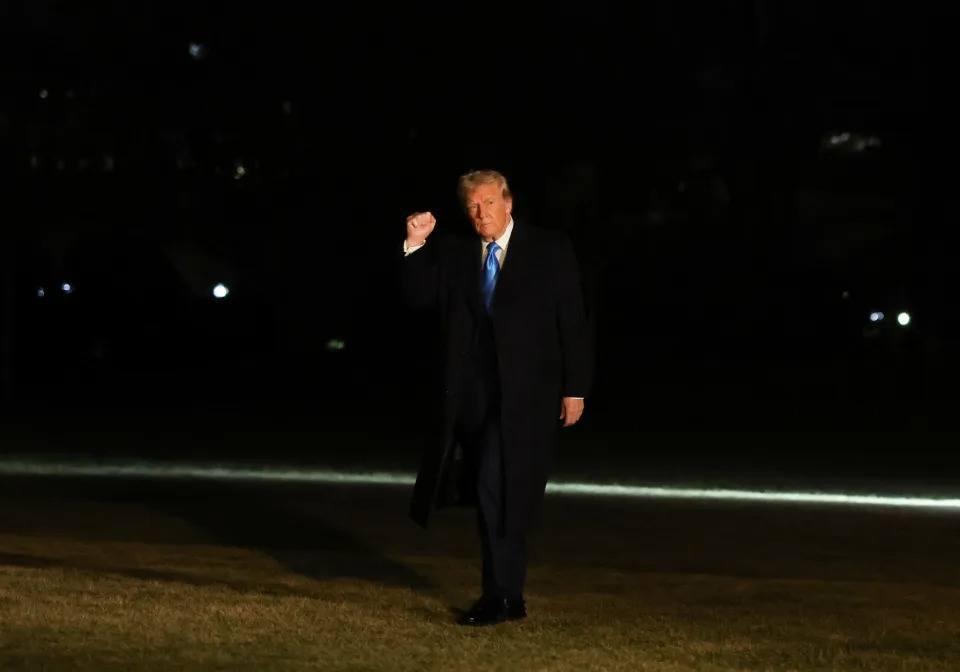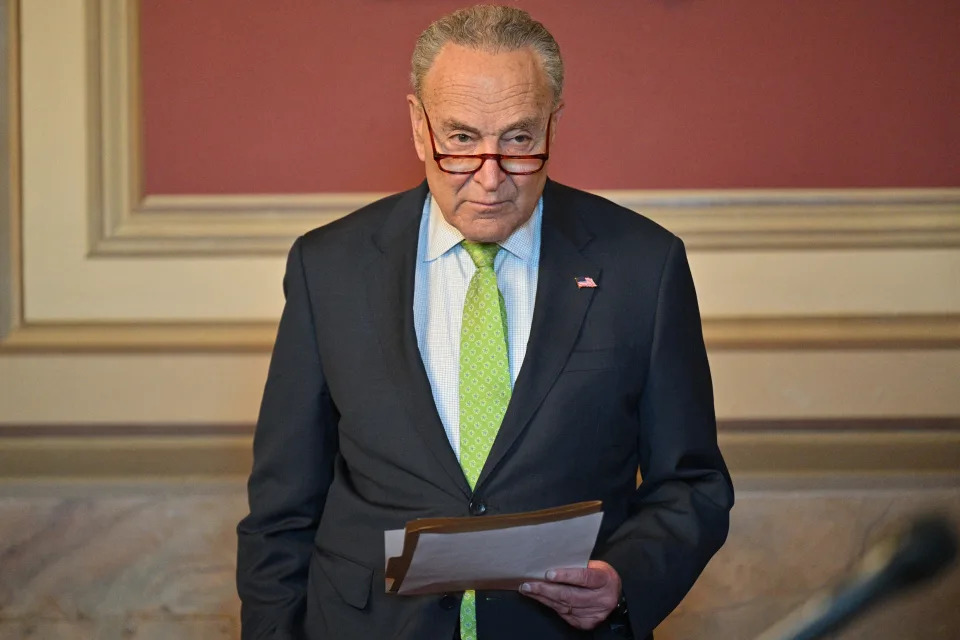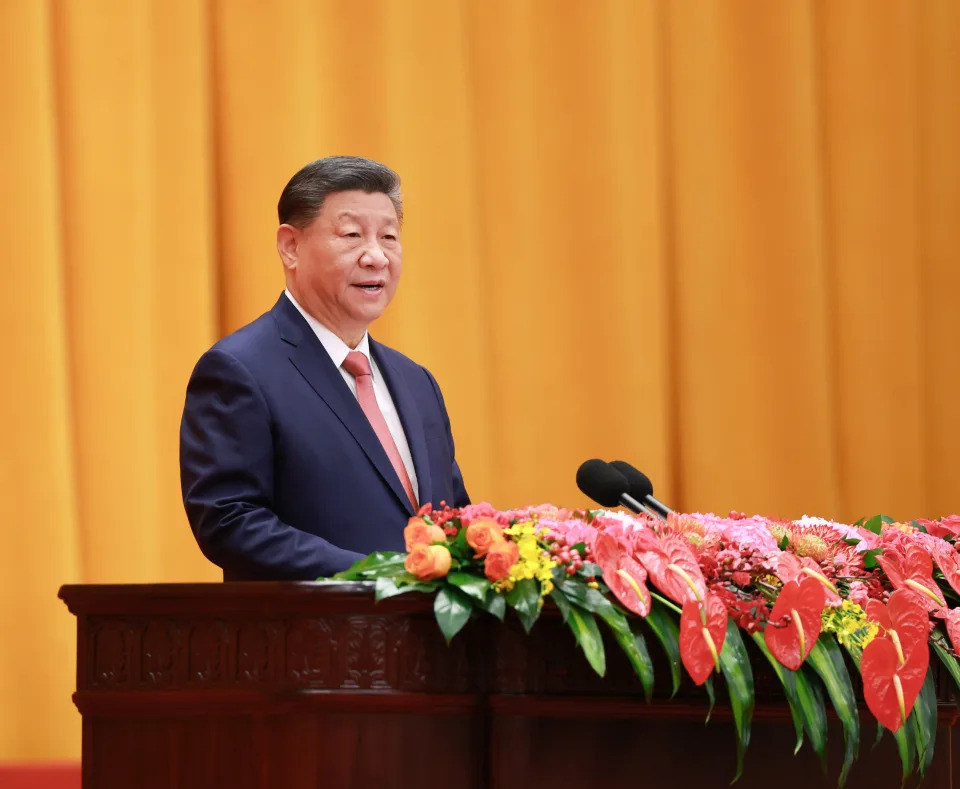For all the norm-shattering of Donald Trump's Saturday move to levy tariffs on America's top three trading partners, few signs have emerged in the hours since that any force outside of the president himself will be able to quickly reverse his decision if he is determined to stay the course.
While rhetorical opposition is already evident from Wall Street to Capitol Hill, any challenges in political or legal arenas are expected to be protracted and an uphill climb after decades of tariff authority migrating to the executive branch.
Canada's ambassador to the US acknowledged as much in a television appearance Sunday, saying that the tariff plan "is really something that is in the president's hands."
Trump announced Sunday that new talks with Canada and Mexico are in the offing today as the nations try to avert the duties, but the president downplayed the chances he will change his mind. The duties are scheduled to go into effect at 12:01 a.m. ET Tuesday.
"I don't expect anything very dramatic," he said Sunday of his expectations for today's meetings.
In a Truth Social post on Monday morning, Trump said he spoke with Canadian Prime Minister Justin Trudeau and would talk again at 3 p.m. ET. He also raised new issues such as Canada’s limits on the US banking system.

Perhaps the key open question for the immediate term is whether market volatility, which was clearly evident Monday morning, could be the thing that can change Trump's mind now or if a sell-off becomes extended.
Capitol Economics wrote in a Monday note that "if the tariffs stick around, let alone escalate, this morning's market moves may be just the start of greater volatility."
Trump has long used the markets as a barometer of success, but it's a metric he says he is willing to discount, at least for now.
As he put it Sunday , there could be pain ahead, but, as he said in all caps, "IT WILL ALL BE WORTH THE PRICE THAT MUST BE PAID."
Read more: What are tariffs, and how do they affect you?
Scattered opposition from Congress
The Democrats' leader in the Senate, Chuck Schumer of New York, slammed the move Sunday and announced that Democrats are going to propose a bill that could take some of Congress's tariff power back.
"I will work with my colleagues to undo this mess," Schumer promised.
Indeed it is Congress that formally — per the US Constitution — has the power to "lay and collect Taxes, Duties, Imposts and Excises." But Schumer and his colleagues likely face long odds given the current political climate and after decades where lawmakers have ceded much of their tariff power to the Oval Office in a series of bills.
That history has given Trump a wide array of options.
This weekend, he chose a 1977 law called the International Emergency Economic Powers Act which grants the president wide latitude and only asks for consultation with Congress "in every possible instance."
And other authorities also stand at the ready with the promised additional tariffs expected to be levied under different authorities — from Section 338 of the Tariff Act of 1930 to Section 232 of the Trade Expansion Act of 1962.

There are also plenty of Republicans who are openly critical of the move or have been notably silent in recent days , but it remains to be seen if any bipartisan opposition can crystalize if the tariffs go into effect.
Canada is clearly aiming to try and drive a wedge there, announcing early retaliation plans focused on a series of goods that could make Trump's closest political allies feel the most pain.
Liquor made in Tennessee and Kentucky, oranges from Florida, and products like wheat that are key to an array of rural Trump-friendly economies are set to be targeted.
But at the end of the day, any move from Congress to try and stop Trump would almost surely take time and force the GOP into an extraordinary challenge to its party leader.
And in the hours since his announcement, the White House has circulated lists of supportive commentary from over a dozen of Trump's closest Capitol Hill allies.
Perhaps the unlikelihood of dramatic action from Congress on this issue was encapsulated in a 60 Minutes appearance by Sen. Mitch McConnell, who has emerged as a key GOP voice willing to challenge Trump .
"It will drive the cost of everything up," he said of tariffs but also quickly noted elsewhere in the conversation with the CBS program that his overall plan is "I expect to support most of what this administration is trying to accomplish."
Veda's Henrietta Treyz noted another key factor.
"Investors should take these tariff threats seriously because Congress needs the money," she wrote in a weekend note, pointing to plans afoot in Congress to use the likely tariff revenue to offset the costs of other priorities like tax cuts.
Uncertain legal challenges
Trump’s move is almost sure to draw legal challenges, especially if tariffs go into effect on Tuesday and importers and other US businesses are able to claim standing to sue after the tariffs go into effect.
Business groups from the US Chamber of Commerce and the Business Roundtable are expected to be involved in any legal pushback and other sector-specific groups could also file suit.
But experts have long anticipated lawsuits and caution that Trump’s move to invoke national security this weekend could make any judge wary of stepping in.
A judge could be asked to freeze the tariffs but any case could also enter a years-long process of litigation — and not offer any immediate challenge to Trump's ability to act.
"These tariffs will remain until Trump obtains his desired policy outcomes or until the courts strike them down," Raymond James' Ed Mills wrote in a weekend note.

China also pledged this weekend to file a "lawsuit" against the US using the World Trade Organization as a venue.
But the power of the Geneva-based trade watchdog has been seriously limited since 2019 when the first Trump administration blocked the appointment of judges to the body.
And, in the meantime, Trump is promising more tariffs likely lie ahead on issues from semiconductors to steel.
"It will definitely happen with the European Union," he added Sunday night of just one of his additional tariff plans. "I can tell you that."
This post has been updated with additional developments.
Ben Werschkul is Washington correspondent for Yahoo Finance.
Every Friday, Yahoo Finance's Rick Newman and Ben Werschkul bring you a unique look at how US policy and government affect your bottom line on Capitol Gains. Watch or listen to Capitol Gains on Apple Podcasts , Spotify , or wherever you find your favorite podcasts.
